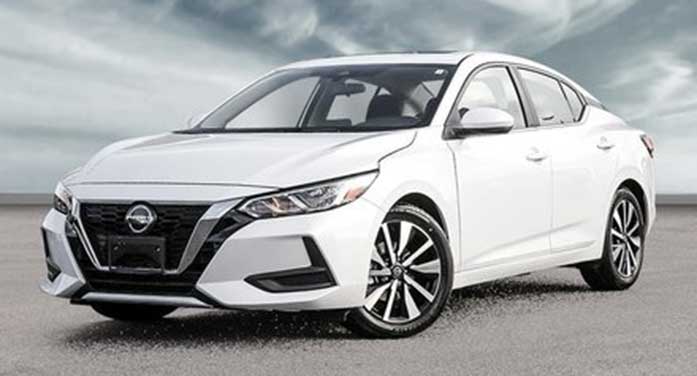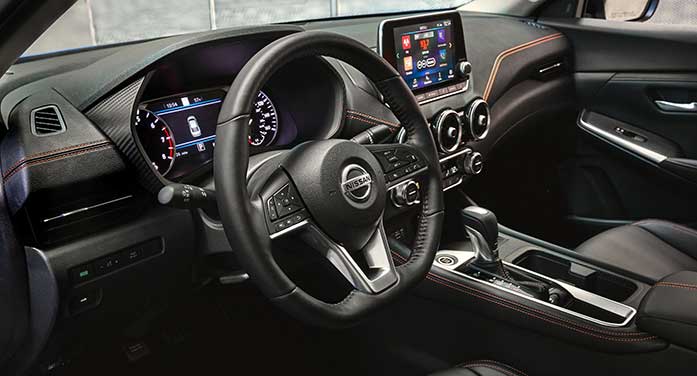
The Sentra won’t burn up the pavement. It’s moderately powerful, handles reasonably well and has decent braking. Despite its sleek racer styling, it’s not a sports car, and the emphasis is on usability, not thrills. And that suits most people in this market just fine
 Things have slowed down a little in the compact sedan market over the past few years.
Things have slowed down a little in the compact sedan market over the past few years.
It used to be that when people went shopping for affordable transportation, they’d be thinking about the Honda Civic, Chevrolet Cruze, Volkswagen Jetta, Nissan Sentra and so on.
But these days, it’s compact SUVs that are catching people’s eyes: Honda HR-V, Hyundai Kona, Kia Sportage, Hyundai Venue, Subaru Crosstrek, and on and on.
The compact sedan, while not gone forever, isn’t the car it used to be. Ford doesn’t even make them anymore.
But that doesn’t mean compact sedans are dinosaurs. Far from it – they still represent good value for money, excellent usability, thrift of operation and excellent day-to-day practicality.
Take the Nissan Sentra. First introduced to the market in 1982, it’s now in its eighth generation and has never been better. It’s built in Mexico and comes in seven trim levels for the Canadian market.
| RELATED CONTENT | |
| The 2022 Mazda MX-5 remains true to its sports car roots By Ted Laturnus |
|
| Plenty right with the Hyundai Ioniq 5 – if you can wait By Ted Laturnus |
|
| Manual version of 2022 Honda Civic Hatchback is your best bet By Ted Laturnus |
|
|
Power for all models is delivered via a two-litre four-cylinder engine that develops just under 150 horsepower.
It’s mated to either a continuously variable transmission (CVT) or a six-speed manual gearbox. While there have been issues with the CVT over the past few years – vague throttle response, slipping at certain RPMs, unpredictability, etc., etc. – it does seem to be sorted out. I’m not 100 percent onboard with CVTs, but in this iteration of the Sentra, it’s better than it used to be. Plus, kudos to Nissan for offering a manual transmission.
Elsewhere, the Sentra offers almost 14.3 cubic feet (405 litres) of cargo space in the trunk. The Honda Civic is good for 14.8 cubic feet, and the Kia Forte will give you 15.3 cubic feet, so the Sentra is in the thick of it for cargo capacity.
I also like the interior elbow room of the Sentra – no feelings of being cramped and plenty of space to stretch out. Heated seats are standard issue, as are steering-wheel-mounted audio controls and Bluetooth. I definitely like the ‘normalness’ of switchgears such as the audio controls, heat/ventilation and so on.
And here’s a little feature I appreciate: speed-sensitive audio control. When you come to a stop, the radio volume will come down appropriately and then resume its previous level once you’re underway. Not a big deal, but nice.
My SR Midnight edition also came with heated steering wheel, “sport” interior, larger 18-inch wheel and tires, and intelligent cruise control, among other things.
Needless to say, nanny features such as lane-departure warning, blind-spot warning and rear-cross traffic alert are also standard issue on all models.

Heated seats are standard issue, as are steering-wheel-mounted audio controls and Bluetooth, and I definitely like the ‘normalness’ of switchgears such as the audio controls, heat/ventilation and so on
The Sentra is a well-equipped automobile at a just under $21,000 starting price. In fact, I’d have to say that the base model is probably the one to go with here. It gives you what you need and most of the extras found on the pricier models are more window dressing than anything else. That said, they’re available if you want things like backup camera, power seats, peripheral camera, glitzy paint and so on.
The Sentra won’t burn up the pavement. It’s moderately powerful, handles reasonably well and has decent braking. Despite its sleek racer styling, it’s not a sports car: the emphasis is on usability, not driving thrills.
And that suits most people in this market just fine.
On the highway, it’s reasonably quiet. Around town, it’s more than able to manage the cut-and-thrust, point-and-squirt driving that seems to be symptomatic of most Canadian cities.
I still have reservations about the CVT, but I suppose I could put up with it.
2022 Nissan Sentra
Base price: $20,098
Engine: 2.0-litre four cylinder
Transmission: six-speed manual or continuously variable
Drive: front-wheel
Horsepower: 149 at 6,000 rpm
Torque: 146 foot pounds at 4,000 rpm
Fuel economy (litres/100 km): 8.2 city and 6.1 highway, with CVT and regular gas
Some alternatives: Honda Civic, Kia Forte, Hyundai Elantra, Mazda3, Volkswagen Jetta, Chevrolet Cruze, Toyota Corolla
Ted Laturnus has been an automotive journalist since 1976. He was named Canadian Automobile Journalist of the Year twice and is past president of the Automobile Journalists Association of Canada (AJAC). For interview requests, click here.
The opinions expressed by our columnists and contributors are theirs alone and do not inherently or expressly reflect the views of our publication.
© Troy Media
Troy Media is an editorial content provider to media outlets and its own hosted community news outlets across Canada.

